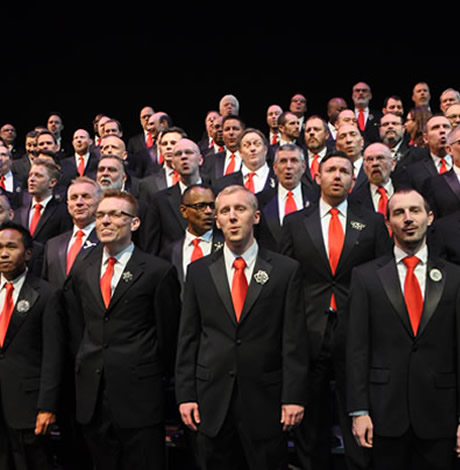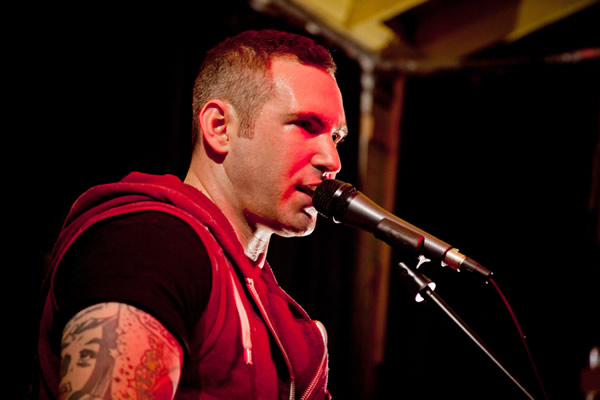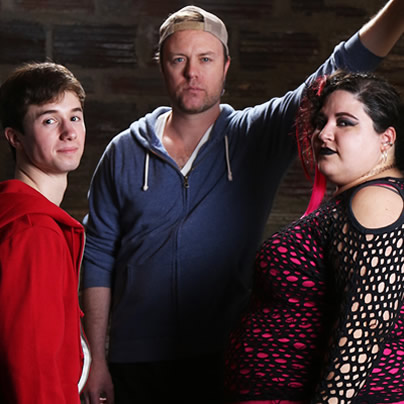Arts & Entertainment
D.C. arts briefs: May 11
Blade hosts Rehoboth kick-off party, Mr./Miss Capital Pride contest and more

Mr. and Miss Capital Pride this weekend
The Mr. and Miss Capital Pride event is Saturday night at Town (2009 8th Street, NW) starting at 6 p.m. There’s a $10 cover and proceeds from the event go to Capital Pride. The deadline to enter has passed but those wishing to watch the contest are welcome to attend. More information on this event and all Capital Pride festivities is here.
Blade summer kick-off in Rehoboth
Washington Blade will host its sixth annual summer kick-off party in Rehoboth Beach, Del., on May 18.
The party takes place from 5-7 p.m. at the Blue Moon, 35 Baltimore Ave. It’s open to the public and there’s no cover charge. Visitors who sign up for the Blade’s e-mail newsletter on-site receive two free drinks.
“We have many Delaware readers and D.C. readers who vacation in Rehoboth,” says Brian Pitts, Blade sales executive and co-owner. “It’s always a fun way to meet advertisers and readers and to kick off the summer season.”
Gay group has family events next weekend
Family Equality Council is hosting a Family Weekend in D.C. starting Thursday.
Zach Wahls, who spoke before the Iowa Legislature in 2011, will serve as honorary family ambassador, joining the Council and families for Families on the Hill, the Congressional lobbying visits that are part of the weekend events.
Families on the Hill will begin at 8:30 a.m. with training for kids and adults. The lobby visits will focus on three issues: adoption and foster care, repeal of DOMA and safe schools.
On May 18, families will have various tour options including the White House, Museum of Natural History, the National Zoo and more.
The events for May 19 include tours of the Capitol.
For more information, including how to register and a complete schedule, visit familyequality.org.
Bethesda Fine Arts Festival gathers wide-ranging talent

‘Red Light, Grace Street’ by Joseph Craig English, will be on display at the Bethesda Fine Arts Festival this weekend. (Image courtesy the Festival)
Artists representing 25 states and Canada will be showcasing their work at the ninth annual Bethesda Fine Arts Festival in downtown Bethesda’s Woodmont Triangle this weekend.
The event will also feature live entertainment, children’s activities and restaurants including Haagen Dazs, BlackFinn American Saloon and more.
Some of the artists featured include Doug Blum, Kate Beck, Ivan Radojicic Tom Mcquaid, Lisa Stewart, Giampictro Filippetti and more.
The festival is open Saturday from 10 a.m. to 6 p.m. and Sunday from 10 a.m. to 5 p.m. Admission is free.
Cooper to spin at Cobalt Saturday night
DJ Seth Cooper is coming to Cobalt (1639 R St., N.W.) for Just Circuit on Saturday from 10 p.m. to 3 a.m.
In 2006, Gay Internet Radio Live asked Cooper to join its online radio network, putting his sets next to other big names like randy Bettie Lydia Prim and more. In 2009, Just Circuit named Cooper Best Up and Coming DJ, as well as nominated him for Best After Hours Party.
He’s headlined at Splash Days in Austin, Gay Days in Orlando, Pacha in Brazil and more in clubs across the U.S., Canada, Brazil and China.
The night will also include DJ Sean Morris will be in 30degreees, free vodka from 10 to 11 p.m. and a laser light show by Sound Sign.
Capital Pride Art Fair seeking submissions
Capital Pride is now accepting submissions from all LGBT artists in the D.C. area for the first Capital Pride Art Fair at the festival on June 10 from 11 a.m. to 6 p.m.
The fair will present 12 to 14 artists showing their work in one tent in the Arts Stage area.
To submit work, artists must fill out the form at capitalpride.kintera.org/artfair, providing price range, number of available pieces, samples via jpegs or website and contact information.
The fee for commercial arts is $50 for eight feet of display space. There are a limited number of spaces available for non-commercial artists
Artists may also be interested in donating work to the silent auction held at the Heroes Gala and Silent Auction on May 30.
For more information, contact Capital Pride at [email protected]. Submissions must be received by May 20.
Books
Love or fear flying you’ll devour ‘Why Fly’
New book chronicles a lifetime obsession with aircraft

‘Why Fly’
By Caroline Paul
c. 2026, Bloomsbury
$27.99/256 pages
Tray table folded up.
Check. Your seat is in the upright position, the airflow above your head is just the way you like it, and you’re ready to go. The flight crew is making final preparations. The lights are off and the plane is backing up. All you need now is “Why Fly” by Caroline Paul, and buckle up.

When she was very young, Paul was “obsessed” with tales of adventure, devouring accounts written by men of their derring-do. The only female adventure-seeker she knew about then was Amelia Earhart; later, she learned of other adventuresome women, including aviatrix Bessie Coleman, and Paul was transfixed.
Time passed; Paul grew up to create a life of adventure all her own.
Then, the year her marriage started to fracture, she switched her obsession from general exploits to flight.
Specifically, Paul loves experimental aircraft, some of which, like her “trike,” can be made from a kit at home. Others, like Woodstock, her beloved yellow gyrocopter, are major purchases that operate under different FAA rules. All flying has rules, she says, even if it seems like it should be as freewheeling as the birds it mimics.
She loves the pre-flight checklist, which is pure anticipation as well as a series of safety measures; if only a relationship had the same ritual. Paul loves her hangar, as a place of comfort and for flight in all senses of the word. She enjoys thinking about historic tales of flying, going back before the Wright Brothers, and including a man who went aloft on a lawn chair via helium-filled weather balloons.
The mere idea that she can fly any time is like a gift to Paul.
She knows a lot of people are terrified of flying, but it’s near totally safe: generally, there’s a one in almost 14 million chance of perishing in a commercial airline disaster – although, to Paul’s embarrassment and her dismay, it’s possible that both the smallest planes and the grandest loves might crash.
If you’re a fan of flying, you know what to do here. If you fear it, pry your fingernails off the armrests, take a deep breath, and head to the shelves. “Why Fly” might help you change your mind.
It’s not just that author Caroline Paul enjoys being airborne, and she tells you. It’s not that she’s honest in her explanations of being in love and being aloft. It’s the meditative aura you’ll get as you’re reading this book that makes it so appealing, despite the sometimes technical information that may flummox you between the Zen-ness. It’s not overwhelming; it mixes well with the history Paul includes, biographies, the science, heartbreak, and exciting tales of adventure and risk, but it’s there. Readers and romantics who love the outdoors, can’t resist a good mountain, and crave activity won’t mind it, though, not at all.
If you own a plane – or want to – you’ll want this book, too. It’s a great waiting-at-the-airport tale, or a tuck-in-your-suitcase-for-later read. Find “Why Fly” and you’ll see that it’s an upright kind of book.
The Blade may receive commissions from qualifying purchases made via this post.
Theater
Out actor Kevin Cahoon on starring role in ‘Chez Joey’
Arena production adapted from Broadway classic ‘Pal Joey’

‘Chez Joey’
Through March 15
Arena Stage
1101 Sixth St., S.W.
Tickets start at $93
Arenastage.org
As Melvin Snyder in the new musical “Chez Joey,” out actor Kevin Cahoon plays a showbiz society columnist who goes by the name Mrs. Knickerbocker. He functions as a sort of liaison between café society and Chicago’s Black jazz scene circa 1940s. It’s a fun part replete with varied insights, music, and dance.
“Chez Joey” is adapted from the Broadway classic “Pal Joey” by Richard Rodgers and Lorenz Hart. It’s inspired by John O’Hara’s stories based on the exploits of a small-time nightclub singer published in The New Yorker.
A warm and humorous man, Cahoon loves his work. At just six, he began his career as a rodeo clown in Houston. He won the Star Search teen division at 13 singing songs like “Some People” from “Gypsy.” He studied theater at New York University and soon after graduating set to work playing sidekicks and comedic roles.
Over the years, Cahoon has played numerous queer parts in stage productions including “Hedwig and the Angry Inch,” “La Cage aux Folles,” “Rocky Horror” as well as Peanut in “Shucked,” and George the keyboardist in “The Wedding Singer,” “a sort of unicorn of its time,” says Cahoon.
Co-directed by Tony Goldwyn and the great Savion Glover, “Chez Joey” is a terrific and fun show filled with loads of talent. Its relevant new book is by Richard Lagravenese.
On a recent Monday off from work, Cahoon shared some thoughts on past and current happenings.
WASHINGTON BLADE: Is there a through line from Kevin, the six-year-old rodeo clown, to who we see now at Arena Stage?
KEVIN CAHOON: Anytime I want to land a joke in a theater piece it goes back to that rodeo clown. It doesn’t matter if it’s Arena’s intimate Kreeger Theatre or the big rodeo at the huge Houston Astrodome.
I was in the middle stadium and there was an announcer — a scene partner really. And we were doing a back and forth in hopes of getting laughs. At that young age I was trying to understand what it takes to get laughs. It’s all about timing. Every line.
BLADE: Originally, your part in “Chez Joey” Melvin was Melba who sings “Zip,” a clever woman reporter’s song. It was sort of a star feature, where they could just pop in a star in the run of “Pal Joey.”
CAHOON: That’s right. And in former versions it was played by Martha Plimpton and before her Elaine Stritch. For “Chez Joey,” we switched gender and storyline.
We attempted to do “Zip” up until two days before we had an audience at Arena. Unexpectedly they cut “Zip” and replaced it with a fun number called “I Like to Recognize the Tune,” a song more connected to the story.
BLADE: Wow. You must be a quick study.
CAHOON: Well, we’re working with a great band.
BLADE: You’ve played a lot of queer parts. Any thoughts on queer representation?
CAHOON: Oh yes, definitely. And I’ve been very lucky that I’ve had the chance to portray these characters and introduce them to the rest of the world. I feel honored.
After originating Edna, the hyena on Broadway in “The Lion King,” I left that to do “Hedwig and the Angry Inch” as standby for John Cameron Mitchell, doing one show a week for him.
Everyone thought I was crazy to leave the biggest musical of our time with a personal contract and getting paid more money that I’d ever made to get $400 a week at the downtown Jane Street Theatre in a dicey neighborhood.
At the time, I really felt like I was with cool kids. I guess I was. And I never regretted it.
BLADE: When you play new parts, do you create new backstories for the role?
CAHOON: Every single time! For Melvin, I suggested a line about chorus boys on Lakeshore Drive.
BLADE: What’s up next for Kevin Cahoon?
CAHOON: I’m about to do the New York Theatre Workshop Gala; I’ve been doing it for nine years in a row. It’s a huge job. I’ll also be producing the “Cats: The Jellicle Ball” opening on Broadway this spring; it’s a queer-centric uptown vogue ball with gay actor André de Shields reprising his role as “Old Deuteronomy.”
BLADE: There’s a huge amount of talent onstage in “Chez Joey.”
CAHOON: There is. I’m sharing a dressing room with Myles Frost who plays Joey. He won accolades for playing Michael Jackson on Broadway. We’ve become great friends. He’s a miracle to watch on stage. And Awa [Sal Secka], a D.C. local, is great. Every night the audience falls head over heels for her. When this show goes to New York, Awa will, no doubt, be a giant star.
BLADE: Do you think “Chez Joey” might be Broadway bound?
CAHOON: I have a good feeling it is. I’ve done shows out of town that have high hopes and pedigree, but don’t necessarily make it. “Chez Joey” is a small production, it’s funny, and audiences seem to love it.

The Capital Pride Alliance held the annual Pride Reveal event at The Schuyler at The Hamilton Hotel on Thursday, Feb. 26. The theme for this year’s Capital Pride was announced: “Exist. Resist. Have the audacity!”
(Washington Blade photos by Michael Key)








































